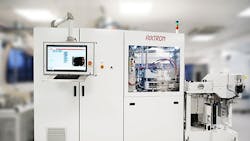Chinese Firm Scraps Aixtron Deal after US Block
Grand Chip, a Chinese company, said on December 8 that it had scrapped plans to purchase semiconductor equipment maker Aixtron after President Barack Obama blocked a key element of the deal on security concerns.
The Chinese government-backed Grand Chip Investment said its offer could no longer go through after Washington rejected the inclusion of Aixtron’s U.S. unit over fears it could put sensitive technology with potential military applications in Chinese hands.
In a statement, Grand Chip said the block meant that the conditions of the deal “no longer can be fulfilled.”
“Any contracts based on the acceptance of the takeover offer will not become effective.”
The failure of the proposed 670-million-euro (US$714-million) takeover comes at a time of growing unease in the West about a recent slew of Chinese takeovers, often by state-backed companies.
The death knell for the Aixtron deal came last week after a review by the Committee on Foreign Investment in the United States (CFIUS) chaired by Obama found that the national security risks were too great.
In a statement last week, the U.S. Treasury said Aixtron’s expertise in advanced compound semiconductors used for LED lighting, lasers and solar cells also has military applications.
The Treasury said Aixtron’s U.S. business was an important contributor to that technology.
Beijing expressed frustration in response, saying it was opposed to “politicizing normal business behavior” and accusing Washington of making “groundless accusations” against Chinese firms.
The troubled deal had also come under scrutiny in Germany where Chinese companies have bought a record number of tech firms this year, sparking criticism of homegrown intellectual property being sold off to Beijing.
Links to Beijing
After initially giving the proposed Aixtron takeover its blessing, the German government withdrew its approval in late October following security worries raised by Washington.
Citing German intelligence sources, the Handelsblatt daily reported at the time that the US had expressed fears that China could use Aixtron technology to bolster its nuclear program.
In response, Germany’s economy ministry announced that it was putting the deal back under review.
The U.S. Treasury department did not say what military application exactly of the German company’s technology had concerned U.S. officials.
Aixtron’s speciality is a technology for depositing thin layers of atoms on semiconductor wafers that are used in electronic devices and systems that produce, control and convert light. It is popularly used in making solar cells.
According to the Treasury, Grand Chip is “ultimately owned by investors in China, some of whom have Chinese government ownership.”
It added that the deal would be financed by a unit of China IC Industry Investment Fund, a Chinese government-supported industrial investment fund designed to support the country’s integrated circuit industry.
Aixtron shares fell by more than three percent in early afternoon trading in Frankfurt on news that the deal had fallen through.
The company has some 750 employees in Germany and annual revenues of around 200 million euros. Its division in California employs around 100 people.
Grand Chip said the shares of Aixtron investors who had already accepted the takeover offer would be returned on December 13.
By Benjamin Carlson
Copyright Agence France-Presse, 2016
About the Author
Agence France-Presse
Copyright Agence France-Presse, 2002-2025. AFP text, photos, graphics and logos shall not be reproduced, published, broadcast, rewritten for broadcast or publication or redistributed directly or indirectly in any medium. AFP shall not be held liable for any delays, inaccuracies, errors or omissions in any AFP content, or for any actions taken in consequence.
